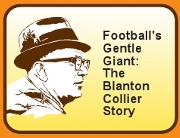
| about us |
about Blanton Collier |
news and events |
team physician's corner |
frank's dawg pound |
feedback | contact us |
The 2009 NFLPA, Kentucky Chapter Blanton Collier Award
The Recipient Of The 2009 NFLPA, Kentucky Chapter Blanton Collier Award – Coach Tony Dungy!
Coach Tony Dungy, retired head coach of the Indianapolis Colts and the Tampa Bay Bucaneers has been named the recipient of the 2009 NFLPA- Kentucky Chapter's 3rd Annual Blanton Collier Award for INTEGRITY ON AND OFF THE FIELD. He will be presented the award at the 7th annual Kentucky Chapter NFL Hall of Fame Ceremony on Friday evening, June 19th, at the Opera House in Lexington, Kentucky.
Most Caring Coach
Picked from 1,503 nominees to USA Weekend, three mentors stood tall.
By Allyson Dickman, Vicki Kriz and Adaora Otiji USA Weekend 5/29/09-5/31/09
FOR THE 17th year, readers nominated outstanding youth coaches who inspire their young charges. Our judges chose three winners from 10 finalists. Each receives $1,000 and will be honored this summer by the World Sports Humanitarian Hall of Fame. One of the three finalists is coach Danny Carothers from Bowling Green, KY.
Helping boys keep their eyes on the ball and on what's important
Danny Carothers, 48, has found concrete ways to support the 10- to-12-year old boys he coaches on the west side of Bowling Green, where youth football is more than an outlet. Many of Carothers' players have no male role model, and some come from homes where poverty, drugs and abuse are present.
"Carothers believes the anger and aggressiveness the players take out on the field begins at home," says nominator Elizabeth Lauer.
Off the field, the father of six treats the boys to outings like skating and high school football games, meals and hanging out at his house with his 12-year-old son. He invites community leaders - policemen, doctors, teachers and former players - to talk to his boys. "The older kids see they are important as role models, and the younger kids see what they can achieve," says Ron Whitlock. Carothers, Whitlock and and four other men also helped start West Side Camp, a summer enrichment program held on Whitlock's farm for boys on and off the team. "He wholeheartedly gives of himself," says team mom Judy Burnam. "It's him seeing a need and not wanting these kids to fall short and not fall into the wrong hands."
Carothers is a long-term figure in his players' lives. "Their motto is 'Once a Bear, always a Bear,' " says Roger LaPoint, whose son played for Carothers. "Danny's their surrogate father - they want to share their accomplishments with him - and he's there to support them."
"Danny was my role model as a kid," adds former Bear Jared Carpenter, now at Northwestern University. "He was the man who made the game fun. We played hard for him because you never knew when he would come get you and take you out for ice cream. When I grew up, he kept me confident, always complimenting me and always watching me play even though he wasn't coaching me. He became more of a mentor for me and one of my biggest fans."
More important, he keeps the boys active in their community. The Bears regularly visit residents at a local nursing home and distribute Thanksgiving turkeys to neighbors. One year, the boys met an old friend of Carothers who was raising her two grandchildren while battling cancer. With a little encouragement from their coach, the players brought that family a Christmas dinner and gifts, and some of the boys gave the family $5 of their own allowance.
Carothers has taken players in and has them over on weekends. And when a player needs anything - from a coat to a hot meal - the coach is there to provide it, either from his own pocket or gathered help from the community.
To Carothers, the wins on the field don't matter. His greatest joy comes from simply being with his young men. "I get to interact with these kids - it gives me a chance to be very close to them," Carothers says. "It's all about knowing that you've got them around you for a couple of hours every week."
Let's Stop Tolerating All Abusive Coaches
By Mike Giuliano – April 10, 2005
Dr. Mike Giuliano was the women's soccer coach at San Diego State at the time of this article.
He yelled profanities at our kids. He called them names. He became a serious challenge to the development of their self-esteem. He was spiteful toward them. He was downright mean to them.
And we paid him many thousands of dollars to do all of this to our sons and daughters.
I know, scores of columnists and talk-show hosts have lamented the sorry state of youth coaching in our society. They scare us with stories of abuse, both physical and mental, all in the name of winning. And yet, every week, I hear and see score and scores of atrocities that don't make it on the talk-show circuit.
As a Division I collegiate soccer coach, much of my time is spent patrolling the sidelines in search of the next Mia Hamm. Add to that many more hours I spend cheering on my three kids as they play their various sports of choice. I see lots of youth coaching, from the AYSO volunteer parent-coach to the club coach making nearly six figures to run a nationally ranked program. And at all of those levels, I still cannot believe what I see and hear: 10-year-old boys being screamed at by red-faced volunteer coaches, and 18-year-old girls being called the vilest of things, simply because they are not playing up to the standards of their coach.
Last summer I attended a high-powered club tournament in the East. I had the unfortunate opportunity to witness a coach in the middle of a halftime meltdown. With sweat streaming down his face, he proceeded to direct a profanity-laced assault at almost every player on the team. To win this tournament meant scholarships for all of them to major colleges, he screamed, adding that their uninspired play was sure to sicken the recruiters, just as it sickened him. On and on he went, and yet the parents of the players sat nearby through it all, straining to hear with one ear while exchanging chatter about the latest community gossip with the other.
One of those parents was in my office a few weeks later, explaining to me why his daughter was truly Mia II. The subject of his daughter's club coach came up.
"Yeah, the guy is certifiably insane," he began. "But, hey, he makes them into winners. Before he came, they hadn't won the league title in over five years!" The father didn't scream at his child (at least not that I knew of). The father didn't belittle her ability or her weight or her lack of heart in front of her friends. The father didn't find the most sarcastic ways possible to tell her how she was ruining it all for her teammates. But he paid another man handsomely to do it instead.
It is not getting better, and, in my view, in many circles it is getting worse.
At the high school level, there is so much concern over the price of college that any coach who may increase our children's chances of securing an athletic scholarship is treated with reverence, regardless of his or her demeanor. It is often worse at the college level, for the financial stakes are even higher for the institution. And, sadly, it is often just as bad at the youth level.
The outcome of all of this has been well-documented in scores of studies of childhood development. These kids are more likely to develop serious self-esteem problems. These kids are more likely to marry abusive spouses. These kids are more likely to abuse their own spouses, for they have learned that verbal abuse unleashed for a "good cause" is justified.
We wouldn't let classroom teachers talk to our kids this way. We may not even let parents publicly treat their own kids this way. And yet, our pragmatically driven approach to youth sports causes us to turn a deaf ear and a blind eye when such behavior is accompanied with on-field success.
The youth/collegiate sports community must come to embrace three truths:
1) While fear and intimidation can motivate us, the negative by-products of such behavior far outweigh the advantages.
2) What our kids learn in the arena of sport, they will practice in society.
3) It doesn't have to be this way. At every level of sport, there are great examples of coaches who motivate and teach their athletes with compassion instead of anger. They teach us that winning and learning and fun and respect and dignity can all play in the same orchestra, often with stunning results.
But if we can't change youth sports culture overnight, we can at least change the future of our own children. Never, ever let your child play for a coach who has forgotten that at the end of the day, it is still just a game. Never, ever let your child be taught that verbal harassment has a useful purpose in society. If we just rescue one child at a time, perhaps one day the abusive coach will end up with no kids left to abuse.


